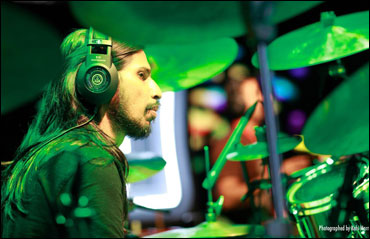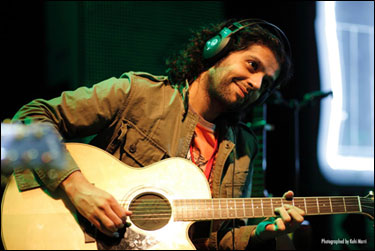Instep:
What was it like working with Rohail Hyatt and the House Band
again this Season?
Gumby: Rohail and myself have been in touch and worked together
with Vital Signs way back in the mid-late '90's. His concept of
working with singer or musicians is really natural and he knows
how to bring out the best in everyone. I appreciate producers
who have faith in singers and musicians, and Rohail seems to be
one of the very few who practice that.
The houseband just has me speechless, the quality of musicianship
and the diversity is really something to experience if you're
a musician. Everyone from Shezi to Babar Khanna plays a very significant
role. I believe that the performance that the audience experience
on television wouldn't be the same if one of them weren't there.
 Omran Shafique: It's great working with everybody from the house
band and the rest of the CS crew because, by now, we know each
other all too well. So it's like a massive three month family
reunion, uffff! This time around Rohail had a more defined vision
for CS and the houseband knew what they needed to do, so we just
dove in. Our sense of adventure did not wane, however, we were
more acutely aware of the previous season's success and a conscious
decision was made to not simply try and emulate it again. The
previous season's success also freed Rohail up to not worry about
how mainstream or commercially viable this season would be, instead
focusing on presenting traditional sounds using the houseband
without detracting anything from the vocals and lyrics. As it
is with projects of this scope, we didn't agree with all the decisions
all the time, but the final call was always deferred to Rohail
and he had to make the tough decisions, thankfully.
Omran Shafique: It's great working with everybody from the house
band and the rest of the CS crew because, by now, we know each
other all too well. So it's like a massive three month family
reunion, uffff! This time around Rohail had a more defined vision
for CS and the houseband knew what they needed to do, so we just
dove in. Our sense of adventure did not wane, however, we were
more acutely aware of the previous season's success and a conscious
decision was made to not simply try and emulate it again. The
previous season's success also freed Rohail up to not worry about
how mainstream or commercially viable this season would be, instead
focusing on presenting traditional sounds using the houseband
without detracting anything from the vocals and lyrics. As it
is with projects of this scope, we didn't agree with all the decisions
all the time, but the final call was always deferred to Rohail
and he had to make the tough decisions, thankfully.
Instep:
Anyone in particular you enjoyed working with?
Gumby: It's difficult to point out that one person who I really
enjoyed working with. But from the musicians it has got to be
Javed Iqbal (on violin). He's what I call a complete musician.
As for the artist I've had a few favorites such as Rahat Fateh
Ali from the first season, Gurpreet Channa from the second season
and definitely Abida Parveen and Rizwan & Muazzam from this
year.
Omran Shafique: There were moments with just about every artist
that were transcendental, but the sublime Tina Sani and the amazing
Abida Parveen stand out the most in general. I was constantly
looking around in disbelief, playing with these two luminaries.
Instep:
What are your views on Coke Studio so far?
Gumby: It's something that was needed for a long time. A good
quality show that showcases not just undiscovered talent but also
sets the standards of audio and visuals. With names like Adnan
Malik and Zeeshan Parwez who have played a major role in making
us musicians and artists look good and Rohail constantly managing
everything I say I wonder if there is more that anyone could ask
for in terms of a team.
Omran Shafique: It's a slowly evolving beast, l'm interested to
see how much it will end up evolving. At the end of it all, and
it's hard to be objective about it since I was involved in it,
and just gauging the reactions from other people, it has become
a phenomenon that is purely Pakistani on a global stage. And that
is something we can all be proud of.
Instep:
In Season 3 what has been your favorite moment?
Gumby: I guess it had to be when I nailed down one of Zeb and
Haniya's songs. It was a Turkish song and it was a mind block
and couldn't figure it out for the love of music. But with a bit
of help from the producer and my fellow musicians I eventually
figured it out and yes, it was a proud and definitely favourite
moment.
Omran Shafique: Jaffer Zaidi running up to me gleefully, and not
without a little bit of crazy in his eyes, saying he just came
up with the chords for 'Mori Araj Suno' (Tina Sani) and no chord
progression repeats throughout the 15 minute song until the very
end. Infinite seemingly random chord changes are the bane of all
musicians so we were quite apprehensive. But, Jaffer's enthusiasm
(and sadism) notwithstanding, the song turned out beautifully.
Instep:
As compared to previous seasons, Coke Studio has gone more in
the direction of folk music this season. Do you feel that might
limit the publicity?
 Gumby:
The direction is usually natural, and given the names in folk
and contemporary music I say it's a good balance and I think it's
high time that folk music is brought out in the limelight for
everyone to experience. The show is about diversity and I think
that's what it's living up to.
Gumby:
The direction is usually natural, and given the names in folk
and contemporary music I say it's a good balance and I think it's
high time that folk music is brought out in the limelight for
everyone to experience. The show is about diversity and I think
that's what it's living up to.
As for publicity, I think if something is done well that in itself
dictates publicity.
Omran Shafique: It might. We were well aware that many fans of
the previous seasons might not get into it as much. But, thankfully,
being driven by a passion for music, and not the rupees (although,
the rupees are nice when they come and they enable us to keep
this donkey cart rolling) limited publicity is not much of a concern.
Instep:
Were there any challenges or problems faced? If so, what were
they and how were they resolved?
Gumby: In a project of this magnitude there always are difficulties
faced, however for me with extensive hours or rehearsal and different
genres and keeping up with song structures and sometimes odd time
signatures. Also, it's not easy playing together as a unit especially
when most songs are improvised. Though the monitoring setup and
the cues and with Rohail constantly giving us a bigger picture
it's amazing to be a part of such an exciting and challenging
setup.
Omran Shafique: A challenge for me, personally,was that Rohail
needed us to play all sorts of crazy eastern-sweetened tunings
on our guitars so that they didn't clash with the eastern based
singers. This meant Asad and I had to relearn our instruments
constantly for each song. I ended up doing the best I could given
the circumstsnces. Whether the challenge was met or not depends
on who's listening.
-All Coke Studio photos by Rizwan ul Haq and Kohi Marri

